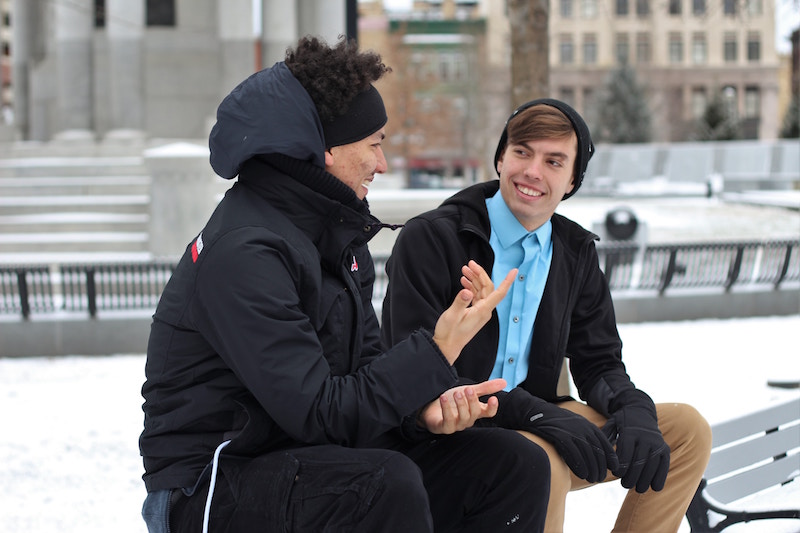I’m sure you have been in this situation: when meeting a German speaker, you’d like to try to speak with him/her. You are listening attentively and want to confirm you are understanding her/him… but how?
1. Saying hi
- Hallo: You can use this one every time of the day all over the German speaking countries.
- Hi/hey: We use these English/American greetings very often in Germany.
- Moin (moin): Typical in northern Germany but it has already spread to the south. (It’s not an abbreviation of Morgen, it comes from low Germ/Dutch mooi[en] meaning “[I wish you a] beautiful [day]”.)
- Grüß dich!: Literally “(I) greet you”, we use it to say hi or when we are introduced to someone new (“nice to meet you”).
- Servus: This one is used in Austria instead of hallo (you can use hallo as well) in an informal way.
- Grüß Gott: This expression is used in Bavaria and Austria. It is a bit more formal than servus. (It’s like saying guten Morgen/Tag in northern Germany.)
2. Asking “how are you?”
- Wie geht’s (dir)?: Standard informal way to ask “how are you?”
- Wie läuft’s (bei dir)?: More general question asking “how is it going?”
- Alles klar/ok (bei dir)?: Meaning “everything ok?”
- Was gibt’s Neues?: Is for asking “Any news?”
- Wie geht’s, wie steht’s?: Informal (rhyming) question to ask “how are you?”
- Wie war dein Wochenende/dein Tag…?: “How was your weekend/day…?”
3. Starting questions or conversations
- Sag mal, …: Is meant to attract the other person’s attraction (“tell me…”).
- Und, …?: Is useful for asking to continue telling.
- Was ist mit (+ dative)…?: “What about…?”
- Was ich dich noch fragen wollte…: “What I wanted to ask you…”
- Und dann/danach?: “And after that?/What happened after?”
4. Starting telling something
- Also…: You can use it to start anything you want to tell or you point of you (“well,…”).
- Übrigens,…: Very useful if you want to add something new or something you forgot to tell (“by the way”).
- Was ich dir (noch) erzählen wollte…: “What I wanted to tell you…”
- Ach…: You can add this interjection before the sentence above or use it alone meaning “What I’ve forgotten/before I forget”.
5. Expressing agreement
- Genau!: “Exactly!, That’s it!”
- Natürlich!/Na klar!: “Of course!”
- (Völlig) klar!/Logisch!/Verständlich!: “(Absolutely) logical/understandable!”
- (Das) stimmt.: “That’s right.”
- Richtig/korrekt: “Right.”
- Da hast du recht.: “You’re right.”
- You can add ja (“yes”) before each one.
- Na gut.: “Ok, you can do it/you’re right.”
6. Expressing disagreement
- Nein!/Nee!: “No!” (The 2nd is more informal.)
- Nö!: Means also “no” but adds a nuance of “I don’t feel like it/I’m not in the mood.”
- (Das) stimmt nicht!: “That’s not right/wrong.”
- Gar nicht wahr!: “Absolutely not true.”
- Leider nein/nicht: “Unfortunately no(t).”
- (So ein) Quatsch!: “What a nonsense!”
7. Expressing amazement
- Echt?/Wirklich?/Im Ernst?: “Really?”
- Das gibt’s doch nicht!: “This/that can’t be true!”
- Unglaublich!/Unfassbar: “Unbelievable/incredible!”
- Ich weiß gar nicht, was ich sagen soll!: “I don’t know what to say!”
- Da bin ich (aber) platt!/Ich fasse es nicht!: “I can’t believe what you’re telling me!”
- Alter Schwede!: The same as above but in slang.
- Boah!: wow!
8. If you are not understanding
- Wie bitte?: The most typical and polite way to ask “pardon?”
- Was?: The same as above but informal.
- Ich verstehe nicht…: “I don’t understand.”
- (Das) verstehe ich nicht!: The same as above but emphasizing a spacial fact/aspect that you don’t understand.
- Sorry?/Entschuldigung?: “Pardon?”
- Wie jetzt?: Slang meaning “I’m lost.”
9. Ending a conversation
- Alles klar…: Like summarizing in order to finish the chat.
- Also dann…: Same as a bove (“well then”).
- Also…: It is useful for starting the last sentence, too.
- Tut mir leid, aber ich muss los.: “I’m sorry but I have to go.”
10. Saying bye
- Bis später/morgen/nächste Woche!: See you later/tomorrow/next week!
- Bis dann!: See you!
- Mach’s gut!: Literally “do it well” but really meaning “bye/see you”.
- Tschüss/tschau!: Bye!
- Tschö!: The same as above but more slang.


